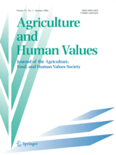
AGRICULTURE AND HUMAN VALUES
Scope & Guideline
Bridging agriculture and humanity for a better tomorrow.
Introduction
Aims and Scopes
- Interdisciplinary Analysis of Agricultural Systems:
The journal promotes research that integrates various fields such as sociology, economics, environmental science, and cultural studies to understand the complex dynamics of agricultural practices and their implications for human communities. - Focus on Social Justice and Equity:
A significant emphasis is placed on social justice issues within agricultural contexts, including gender equity, food sovereignty, and the rights of marginalized communities. This reflects a commitment to exploring how agricultural policies and practices can perpetuate or mitigate social inequalities. - Sustainability and Environmental Impact:
Research published in the journal often examines sustainable agricultural practices, their environmental impacts, and how agricultural systems can be transformed to better align with ecological principles. - Cultural and Ethical Dimensions of Food Systems:
The journal explores the cultural significance of food and agriculture, addressing ethical concerns related to food production, consumption, and the socio-political frameworks that govern these processes. - Community and Local Knowledge:
There is a strong focus on the role of local knowledge and community engagement in agricultural practices, advocating for participatory approaches that empower farmers and local stakeholders.
Trending and Emerging
- Technological Innovations in Agriculture:
Recent publications indicate a growing interest in how digital technologies, such as precision agriculture and data-driven practices, are reshaping farming. This theme is critical as it explores the implications of technology on labor, sustainability, and food security. - Intersectionality in Agriculture:
There is an increasing focus on intersectionality, particularly in how different identities (e.g., gender, race, class) affect experiences and practices in agriculture. This trend reflects a broader societal push towards inclusive and equitable frameworks. - Climate Change and Adaptation Strategies:
Research addressing the impacts of climate change on agriculture and exploring adaptive strategies is gaining traction. This theme is crucial for developing resilient agricultural practices that can withstand environmental changes. - Food Justice and Sovereignty Movements:
Emerging themes include food justice and sovereignty, emphasizing the need for equitable access to food and the empowerment of marginalized communities in food systems. This trend aligns with global movements advocating for sustainable and just food practices. - Health and Well-being in Agricultural Contexts:
There is an increasing emphasis on the health and well-being of farmers and communities involved in agriculture, exploring how agricultural practices impact physical and mental health outcomes.
Declining or Waning
- Traditional Agricultural Practices:
Research focusing solely on traditional agricultural methods without considering modern innovations or socio-cultural impacts has become less frequent, as there is a growing recognition of the need for integration of traditional and contemporary practices. - Purely Economic Perspectives:
Studies that analyze agriculture solely from an economic standpoint, without considering social, environmental, or ethical dimensions, are declining as the journal increasingly emphasizes interdisciplinary approaches. - Generic Policy Analysis:
Generic analyses of agricultural policies without contextualization to specific socio-cultural or geographical settings are becoming less common, as the journal shifts towards more nuanced examinations of policy impacts on diverse communities. - Focus on Production Efficiency:
There has been a noticeable decrease in studies that prioritize production efficiency above all else, as the journal increasingly highlights the importance of sustainability and social equity in agricultural practices.
Similar Journals

Journal of Rural Studies
Connecting Scholars to Rural RealitiesWelcome to the Journal of Rural Studies, a premier peer-reviewed publication dedicated to advancing the field of rural research. Published by PERGAMON-ELSEVIER SCIENCE LTD, this esteemed journal has been a cornerstone of scholarly discourse since its inception in 1985 and continues to evolve through 2024. With an impressive impact factor and categorization in the Q1 tier across various fields, including Development, Forestry, Geography, Planning and Development, and Sociology and Political Science, the journal is among the elite voices in rural studies. Researchers, professionals, and students alike will find invaluable insights within its pages, supported by rigorous empirical research and theoretical explorations that address the complexities of rural life and its myriad challenges. While it currently does not offer open access, the subscription model ensures a broad dissemination of knowledge, fostering collaboration and innovation within the academic community. With a robust Scopus ranking that places it in the top percentiles across multiple social sciences, the Journal of Rural Studies remains an essential resource for those dedicated to understanding and improving rural environments worldwide.
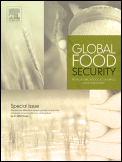
Global Food Security-Agriculture Policy Economics and Environment
Navigating the complexities of food, policy, and sustainability.Global Food Security - Agriculture Policy Economics and Environment is a leading interdisciplinary journal published by Elsevier that addresses critical issues in food security through the lens of agriculture, economics, and environmental sustainability. With an impressive impact factor and a distinguished placement in the Q1 quartile across multiple categories including Ecology, Food Science, and Safety Research for 2023, this journal is a vital resource for researchers and practitioners aiming to address modern challenges in global food systems. Covering essential topics from agricultural policy to ecological implications, the journal provides a platform for innovative research and policy discussions that foster the advancement of food security on a global scale. Notably, it is indexed in Scopus, where it ranks in the top percentiles across its relevant categories, reflecting its significance in the field. The journal is accessible to a wide audience, making it an indispensable source of knowledge for professionals and students aiming to tackle the complex interplay between food production and environmental stewardship.

Future of Food-Journal on Food Agriculture and Society
Exploring the Nexus of Food, Agriculture, and SocietyThe Future of Food-Journal on Food Agriculture and Society, published by Kassel University Press GmbH, serves as a vital platform for emerging research at the intersection of food, agriculture, and societal impacts. With an ISSN of 2197-411X and operating within the realms of Agronomy, Ecology, and Food Science, this journal is pivotal for researchers and professionals aiming to address contemporary challenges in the food sector. Although currently ranked in the fourth quartile across its scholarly categories (2023), the journal showcases a wealth of innovative studies, critical analyses, and global perspectives that strive to enhance our understanding of sustainable agriculture practices, food security, and environmental stewardship. The Open Access format encourages wide dissemination and engagement with research findings, making it an essential resource for students and academics alike. As the journal converges from 2013 to 2024, it aims to foster discussions that will shape the future of food systems worldwide.

International Journal of Agricultural Sustainability
Empowering Change Through Agricultural ResearchThe International Journal of Agricultural Sustainability, published by Taylor & Francis Ltd, is a leading platform for researchers and professionals in the field of agricultural science, economics, and sustainability. With an impact factor that reflects its strong academic credibility and contribution to the field, the journal has earned esteemed rankings, including Q1 in Agronomy and Crop Science and Q2 in Economics and Econometrics for 2023. Engaging an audience keen on advancing sustainable agricultural practices, the journal has embraced Open Access since 2023, facilitating broader dissemination of vital research findings. With Scopus ranks placing it in the top quartiles and percentiles within its categories, the International Journal of Agricultural Sustainability aims to foster interdisciplinary dialogue and innovative approaches to agricultural sustainability, making it an essential resource for students, researchers, and industry professionals alike.
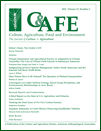
Culture Agriculture Food and Environment
Exploring the Intersections of Culture, Agriculture, and SustainabilityCulture Agriculture Food and Environment, published by WILEY, is an esteemed journal that serves as a pivotal platform for interdisciplinary research at the intersection of cultural studies, anthropology, and agricultural sciences. With its ISSN 2153-9553 and E-ISSN 2153-9561, this journal aims to foster scholarly dialogue on the complex relationships between food, culture, and environmental sustainability. As of 2023, it proudly holds a Q2 ranking in Agricultural and Biological Sciences and Anthropology, as well as a Q1 ranking in Cultural Studies, indicating its significant impact within these disciplines. Researchers and professionals will appreciate its rigorous peer-review process and diverse coverage, which extends from 2011 to 2024, reflecting ongoing debates and innovations in the field. Although open access options are not provided, the journal's commitment to advancing knowledge in understanding food systems and cultural practices makes it a vital resource for academics and practitioners alike, promoting a deeper understanding of the cultural dimensions of agriculture and the environment.

Studies in Agricultural Economics
Elevating Agricultural Economics through Open AccessStudies in Agricultural Economics is a premier journal published by AGRARGAZDASAGI KUTATO & INFORMATIKAI INTEZET in Hungary, focusing on innovative research in the interdisciplinary fields of agricultural, biological, and economic sciences. Since becoming an Open Access journal in 1997, it has aimed to enhance the visibility of agricultural economics scholarship while promoting global engagement among researchers, practitioners, and policymakers. With its robust Q2 and Q3 rankings across varied categories including Development and Geography, this journal serves as a significant platform for disseminating cutting-edge studies that address crucial issues in agriculture and rural development. The journal's continuous publication since 2011 until 2024 exemplifies its commitment to providing timely insights into evolving agricultural challenges. With a strong Scopus ranking across multiple domains, particularly in the social sciences and agricultural sectors, it stands as a vital resource for anyone looking to advance knowledge and practice in these critical areas.

JOURNAL OF AGRICULTURAL & ENVIRONMENTAL ETHICS
Exploring Ethical Frontiers in Agriculture and EnvironmentJOURNAL OF AGRICULTURAL & ENVIRONMENTAL ETHICS, published by SPRINGER, is a leading interdisciplinary journal dedicated to exploring the complex relationships between agriculture, the environment, and ethical considerations. With an ISSN of 1187-7863 and an E-ISSN of 1573-322X, this journal holds a prestigious position in various categories, achieving Q1 rankings in Agricultural and Biological Sciences and History, demonstrating its influence with a Scopus rank of 17th out of 1760 in the domain of Arts and Humanities. The journal aims to provide a comprehensive platform for scholars and practitioners to engage in critical discussions surrounding ethical frameworks affecting agricultural practices and environmental stewardship. Offering a publication window from 1991 to 2024, the journal contributes significantly to both theoretical and practical advances in its field, facilitating access to essential insights that benefit researchers, professionals, and students alike. Situated in the Netherlands, the journal adheres to high academic standards while addressing pertinent global issues.
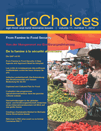
EuroChoices
Bridging theories and trends for a sustainable future.EuroChoices, published by WILEY, is a leading journal in the fields of economics and geography, demonstrating a significant impact as evidenced by its exceptional rankings—Q1 in both Economics, Econometrics and Finance and Geography, Planning and Development for 2023. With an ISSN of 1478-0917 and an E-ISSN of 1746-692X, this esteemed journal has been a pivotal platform for scholarly discourse since its inception in 2003, evolving thoughtfully to encompass contemporary issues and trends through 2024. Situated in the United States, it serves as an essential resource for researchers, professionals, and students alike, offering insights that bridge economic theories with geographical perspectives. While it maintains a traditional publishing approach without open access options, the journal continues to thrive, achieving high ranks in Scopus—with Economics positioned 37th out of 242 and Geography at 151st out of 821—highlighting its role as a critical contributor to the academic community.
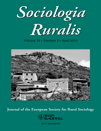
SOCIOLOGIA RURALIS
Unraveling the Complexities of Rural CommunitiesSOCIOLOGIA RURALIS, published by Wiley, stands as a leading academic journal in the field of sociology and political science, boasting an impressive Q1 classification in the 2023 category quartiles. With an ISSN of 0038-0199 and E-ISSN 1467-9523, this journal has been a cornerstone of rural sociological research since its inception in 1960. SOCIOLOGIA RURALIS aims to explore the complexities of rural communities, the dynamics of rural-urban interactions, and the sociopolitical structures that influence rural life. Its esteemed standing is reflected in its Scopus rank of 77 out of 1466, placing it in the 94th percentile of social sciences journals. Although currently not an open-access publication, the journal provides critical insights that significantly advance the understanding of rural issues, making it an essential resource for researchers, practitioners, and students dedicated to the field.
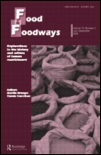
Food and Foodways
Illuminating the Dynamics of Food and SocietyFood and Foodways, published by Routledge Journals, Taylor & Francis Ltd, is a leading interdisciplinary journal dedicated to exploring the complex relationships between food and cultural practices across diverse societies. With its ISSN 0740-9710 and E-ISSN 1542-3484, this journal has established itself as a vital resource for researchers and academics alike, featuring contributions that reflect a wide-ranging scope of issues related to food consumption, production, and identity. As evidenced by its impressive Scopus rankings, including Q1 in Cultural Studies and Q2 in Anthropology, Food and Foodways plays a crucial role in advancing scholarship in the fields of sociology, health (social science), and food science. The journal seeks to foster a deeper understanding of how culinary practices shape and are shaped by social structures, cultural values, and economic conditions. With its commitment to publishing high-quality research from 1985 to the present, it continues to attract a diverse readership, providing essential insights that are relevant to both academic inquiry and practical applications in today’s global food landscape.